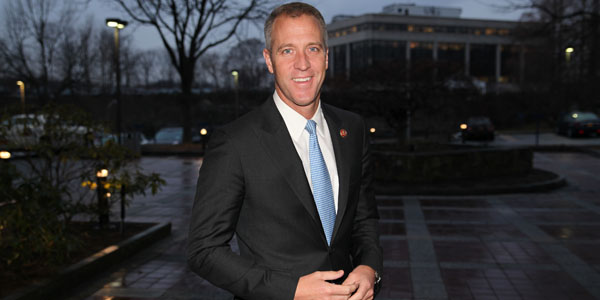Maloney ‘absolutely committed’ to job growth

Freshman Rep. Sean Patrick Maloney, a Democrat hailing from Cold Spring, was among the youngest people to serve as White House staff secretary, doing so during the Clinton administration.
After defeating incumbent Nan Hayworth last November in the state”™s 18th congressional district election, Maloney finds himself just a short walk down Pennsylvania Avenue at the U.S. Capitol.
The Business Journal recently sat down with Maloney to discuss his policy goals and the most pressing needs facing the Hudson Valley business community.
The following are excerpts from that conversation:
Business Journal: What are the biggest needs facing the Hudson Valley?
Maloney: “Short-term, we”™ve got to finish the job on Sandy disaster relief. ”¦ It”™s very important to get help to folks who are hurting, but equally important I want to see us do storm damage prevention ”¦
“Pulling the lens back, the economy and jobs are my number one priority. ”¦ For example, on the west side of the (Hudson River) in Orange County, there”™s a project called Taylor Biomass that will put 300 people to work tomorrow. I think it”™s very important that we support that project. I was in Middletown yesterday ”¦ where Touro College is opening an osteopathic medical college ”“ great project, going to be 1,000 jobs, it”™s going to build off of the health care-focused economy in that part of the district.
“On this side of the river, I think it”™s very important to work with the governor”™s regional economic council in the lower Hudson Valley and Westchester and elsewhere on the priorities they”™ve already identified like supporting the biotech industry, like bringing high-tech manufacturing back to the Hudson Valley. So this is where I want to focus, and I”™m very happy that I”™m on the Transportation and Infrastructure committee where I”™ll really be able to sink my teeth into projects like the Tappan Zee Bridge that”™ll also be critical to future job growth.”
How can Congress help private industry to invest and expand?
“I”™ve run a business ”“ I spent three years running a software company. I”™ve created jobs, I had to meet a payroll, I understand the pressures that particularly small businesspeople face, and I”™m dead serious about trying to make their lives easier.
“What does that mean? In nuts and bolts terms, we”™ve got to continue to reform the tax code to make ourselves more competitive. I”™d like to see us lower rates, broaden the base. I”™d like to see us lower the corporate rate. I”™d like to see us lower the rate for manufacturing. And I think we can achieve that if we close some loopholes and rationalize the code. I”™d like to see us continue to invest in basic research and innovation and education and infrastructure. These are the ways that government really supports and furthers private sector economic development: we know it works, it”™s always worked, we need to start doing what makes sense again.”
You worked in the Clinton White House ”“ how do you apply those experiences now to Congress?
“Politics is all about relationships and I”™ve got a large number of relationships with folks who are working in the administration, people who I worked with in the Clinton administration and elsewhere. That”™s very important. It”™s very important to know how Washington works, it”™s very important to have worked at the state level and to understand Albany and how our state government works, and the reason is because almost every problem we”™ve got to fix requires working with all those people, together ”“ across party lines, at the state, local and federal level. I see it as my job to bring people together and to get things done.”
You”™ve been named to the House Committee on Agriculture. What are your plans to help Hudson Valley farmers?
“You get in and you work on that farm bill, as I”™m going to do over the next nine months. It”™s been extended until September ”¦ that gives me an opportunity to work ”¦ on ways to focus that bill more on the kind of farms we have here in the Hudson Valley. They tend to be smaller, they tend to be family-owned, specialty crops, a lot of organics, a lot of onions in Orange County.
“A lot of the laws are written for big agribusiness ”“ they don”™t make sense for our folks. If you look at the crop loss insurance program, if you look at the way we helped people after Hurricane Irene, or didn”™t, really, we can do a lot better, and I want to be part of that.”